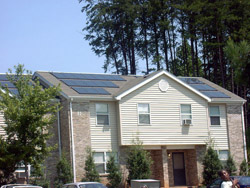Progress Energy offers PV incentives in North Carolina
 Progress Energy will offer residents in its North Carolina service area $1,000 per installed kilowatt (kW) starting in 2011. The incentives come as some state and federal incentives are sunsetting and may face a cloudy future. The move should help spur distributed generation and will help Progress Energy Carolinas meet its renewable energy generation requirements under North Carolina’s renewable energy standard.
Progress Energy will offer residents in its North Carolina service area $1,000 per installed kilowatt (kW) starting in 2011. The incentives come as some state and federal incentives are sunsetting and may face a cloudy future. The move should help spur distributed generation and will help Progress Energy Carolinas meet its renewable energy generation requirements under North Carolina’s renewable energy standard.
The rebate is just part of the three-piece SunSense Solar PV incentive package offered to residents that were approved by the N.C. Utilities Commission on Nov. 15, said Progress spokesperson Scott Sutton. The incentive package applies to Progress customers that install solar systems between 2 kW and 10 kW in size, making the minimum rebate offered under the program, $2,000 and the maximum $10,000, he said.
In addition to the up-front rebate, customers will receive monthly payments for the renewable energy credits generated by their systems for a five-year period. Those payments are based on installed capacity. “The minimum is $9 a month, and it goes up to $45 a month,” he explained.
“For a 10 kW system, that would be 2,700 over five years,” Sutton said. “We need those certificates to show compliance with state law.”
Through the upfront payments and the renewable energy credits alone, an owner’s solar system could qualify for reimbursements of up to $12,700, Sutton said. But Progress also is offering net metering for participants in the program.
“Under the net-metering agreement, any excess generation is sold to us at time of use rate,” he said.
According to Sutton, the actual rate paid varies on the time of day that the energy is produced.
This isn’t Progress’ first foray into renewables, according to Sutton. The Raleigh-based company has offered incentives for large-scale PV projects for two years.
“We already have about 11 megawatts of PV under contract,” he said. And that effort is expanding. For instance, the company signed a power-purchase agreement (PPA) to buy the power produced by the Raleigh Convention Center’s roof, which is in final negotiations even now.
Through this residential program, Progress will add up to 1 megawatt a year for each of the next five years, Sutton said. At the end of the five year period, the company may offer incentives to more residents to install solar.
“Ideally, five years from now, solar will come down in costs and you won’t need an incentive program,” he said.



